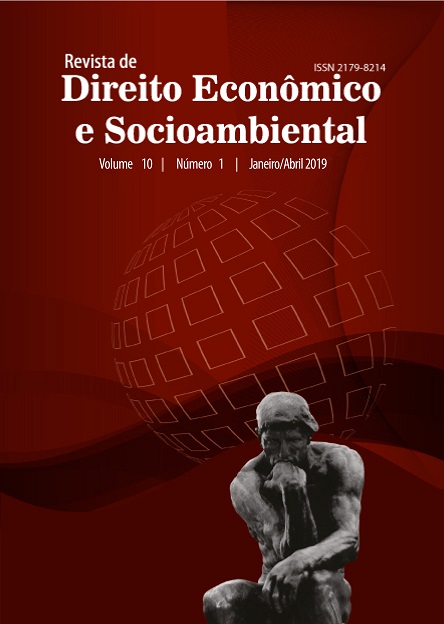Corrupção para além da punição: aportes da economia comportamental
DOI:
https://doi.org/10.7213/rev.dir.econ.soc.v10i1.19003Keywords:
análise econômica do direito, corrupção, economia comportamental, rational choice theory, racionalidade limitada.Abstract
O presente estudo pretende indicar, de modo exploratório, possíveis aportes da análise econômica do direito, da economia comportamental, e dos respectivos experimentos laboratoriais, para o combate à corrupção, buscando indicar as potencialidades de medidas que vão para além do mero discurso punitivista. O caráter multifacetado e complexo da corrupção demanda uma abordagem igualmente multidimensional e interdisciplinar.
Downloads
References
ARIELY, Dan. A mais pura verdade sobre a desonestidade: por que mentimos para todo mundo: inclusive para nós mesmos - Rio de Janeiro: Elsevier, 2012.
AVRITZER, Leonardo et al. (Org.). Corrupção: ensaios e críticas. Belo Horizonte: UFMG, 2008
BECKER, Gary. The Economic Way of Looking at Life. Prize Lecture to the memory of Alfred Nobel, 1992.
Behavioural Insights Team. Corruption: Can a behavioural approach shift the dial?, 2016. Disponível em: <http://www.behaviouralinsights.co.uk/international/corruption-can-a-behavioural-approach-shift-the-dial/>.
BINENBOJM, Gustavo. Poder de polícia, ordenação, regulação. Belo Horizonte: Fórum, 2016.
CARSON, Lindsey D. Deterring Corruption: Beyond Rational Choice Theory, 2014Disponível em http://papers.ssrn.com/sol3/papers.cfm?abstract_id=2520280.
CARSON, Lindsey D.; PRADO, Mariana Mota. Mapping Corruption & its Institutional Determinants in Brazil. IRIBA Working Paper: 08, 2014. Disponível em: http://ssrn.com/abstract=249793.
CARVALHO, Paulo Roberto Galvão de. Legislação Anticorrupção no Mundo: análise comparativa etntre a lei anticorrupção brasileira, o Foreign Corrupt Practices Act norte-americano e o Bribery Act do Reino Unido. In: SOUZA, Jorge Munhoz; QUEIROZ, Ronaldo Pinheiro de. Lei Anticorrupção. Salvador: Editora JusPodivm, 2015.
Escritório das Nações Unidas sobre Drogas e Crime (UNODC). Corrupção e Desenvolvimento. Disponível em http://www.unodc.org/documents/lpo-brazil/Topics_corruption/Campanha-2013/CORRUPCAO_E_DESENVOLVIMENTO.pdf.
FOLHA DE SÃO PAULO. Estudos revelam como a corrupção prospera e funciona. Reportagem de 22.05.2016. Disponível em: <http://www1.folha.uol.com.br/ilustrissima/2016/05/1773117-estudos-revelam-como-a-corrupcao-prospera-e-funciona.shtml>.
GUIMARÃES, Fernando Vernalha. O Direito Administrativo do Medo: a crise da ineficiência pelo controle, 2016 Disponível em: <http://www.direitodoestado.com.br/colunistas/fernando-vernalha-guimaraes/o-direito-administrativo-do-medo-a-crise-da-ineficiencia-pelo-controle>.
JOLLS, Christine; SUNSTEIN, Cass R.; THALER, Richard. A Behavioral Approach to Law and Economics, 1998. Disponível em: <http://www.law.harvard.edu/programs/olin_center/papers/pdf/236.pdf>.
KLITGAARD, Robert. Controlling corruption. Berkeley/Los Angeles: University of California Press, 1988
KÖBIS, Nilset. al. “Who Doesn’t?”—The Impact of Descriptive Norms on Corruption. Aidman EV, ed. PLoS ONE. 2015. Disponível em <https://www.ncbi.nlm.nih.gov/pmc/articles/PMC4487686/>.
LAMBSDORFF, Johann Graf. Behavioral and Experimental Economics as a Guidance to Anticorruption. In D. Serra and L. Wantchekon (eds.) New Advances in Experimental Research on Corruption, Research in Experimental Economics volume 15, Emerald Group Publishing, 2012, p. 279–299. Disponível em: <http://www.icgg.org/literature/Lambsdorff_2012_Behavioral_Economics_Inspires_Anticorruption.pdf>.
MARQUES NETO, Floriano de Azevedo; PALMA, Juliana Bonacorsi de. Os sete impasses do controle da Administração Pública no Brasil. In PEREZ, Marcos Augusto; SOUZA, Rodrigo Pagani (coord.). Controle da Administração Pública. Belo Horizonte: Fórum, 2016
MÉON, Pierre-Guillaume; WEILL, Laurent. "Is Corruption an Efficient Grease?" World Development, Elsevier, vol. 38(3), 2010, páginas 244-259, março. Disponível em: <http://www.suomenpankki.fi/pdf/160134.pdf>.
PEREZ, Marcos Augusto; SOUZA, Rodrigo Pagani (coord.). Controle da Administração Pública. Belo Horizonte: Fórum, 2016.
PRADO, Mariana Mota; CARSON, Lindsey D.; CORREA, Izabela, The Brazilian Clean Company Act: Using Institutional Multiplicity for Effective Punishment . Osgoode Legal Studies Research Paper No. 48/2015, 2015. Disponível em: <https://ssrn.com/abstract=2673799>.
RODRIK, Dani, Economics Rules: The Rights and Wrongs of The Dismal Science. New York: W.W. Norton; 2015. Publisher's Version.
ROSE-ACKERMAN, Susan TRUEX, Rory. Corruption and Policy Reform. Yale Law & Economics Research Paper No. 444. 2012. Disponível em <http://ssrn.com/abstract=2007152>.
ROSE-ACKERMAN, Susan. The Challenge of Poor Governance and Corruption. Copenhagen Consensus, 2004. Disponível em <http://www.copenhagenconsensus.com/sites/default/files/cp-corruptionfinished.pdf>. Acesso em 10 out. 2016.
SERRA, Danila; ABBINK, Klaus. “Anticorruption Policies: Lessons from the Lab” in SERRA, Danila; WANTCHEKON, Leonard. New Advances in Experimental Research on Corruption (Emerald Books), 2012.
SOREIDE, Tina; ROSE-ACKERMAN, Susan, Corruption in State Administration. Yale Law & Economics Research Paper No. 529, 2015. Disponível em: <http://ssrn.com/abstract=2639141>.
SOUZA, Jorge Munhoz; QUEIROZ, Ronaldo Pinheiro de. Lei Anticorrupção. Salvador: Editora JusPodivm, 2015.
THALER, Richard H.; SUNSTEIN, Cass R.. Nudge: improving decisions about health, wealth and happiness. Penguin books, 2009.
ZINNBAUER, Dieter. Ambient Accountability - Fighting Corruption When and Where it Happens, 2012. Disponível em <http://ssrn.com/abstract=2168063>. Acesso em 12 out. 2016.
Downloads
Published
How to Cite
Issue
Section
License
Authors who publish in this Journal agree to the following terms:
- Authors retain copyright and grant the Journal of Economic and Socio-Environmental Law the right of first publication with the article simultaneously licensed under the Creative Commons - Attribution 4.0 International which allows sharing the work with recognition of the authors and its initial publication in this Journal.
- Authors are able to take on additional contracts separately, for non-exclusive distribution of the version of the paper published in this Journal (eg.: publishing in institutional repository or as a book), with a recognition of its initial publication in this Journal.
- Authors are allowed and encouraged to publish their work online (eg.: in institutional repositories or on their personal website) at any point before or during the submission process, as it can lead to productive exchanges, as well as increase the impact and the citation of the published work (see the Effect of Open Access).





















